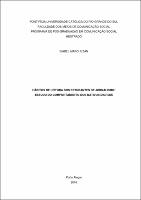| Share record |


|
Please use this identifier to cite or link to this item:
https://tede2.pucrs.br/tede2/handle/tede/6642| Document type: | Dissertação |
| Title: | Hábitos de leitura dos estudantes de jornalismo : estudo do comportamento dos nativos digitais |
| Author: | Marchesan, Isabel  |
| Advisor: | Wainberg, Jacques Alkalai |
| Abstract (native): | O presente estudo, de caráter exploratório, tem por objetivo mostrar o que leem e como se informam sobre a história passada e presente os futuros profissionais do jornalismo. Por meio de um survey, foram entrevistados 52 alunos do curso de jornalismo de três universidades gaúchas (UFRGS, Unisinos e UFSM). Eles são, na maioria, jovens que cresceram cercados por e familiarizados com equipamentos digitais e a internet: são, portanto, parte da geração de nativos digitais. Os estudantes responderam a um questionário sobre seus hábitos de leitura de literatura e periódicos, como usam a internet e qual a influência que as redes sociais têm sobre a forma como leem e como se mantêm informados. As respostas foram quantificadas, e os resultados, comparados a outras pesquisas que também abordaram hábitos de leitura em outros países. Os dados apurados neste survey permitem concluir que a faculdade e o corpo docente têm pouca influência sobre as leituras escolhidas por estes estudantes, e que a leitura de livros é mais motivada pelo lazer do que pela obrigação acadêmica. Também se concluiu que, enquanto a leitura de livros é primordialmente analógica com o uso de papel, o consumo de periódicos é basicamente digital, pois a maioria dos alunos lê este tipo de publicação pela internet, usando o computador. Procedeu-se uma discussão sobre o futuro da leitura: como esta geração consome informação, e quais impactos, positivos ou negativos, as tecnologias digitais já têm e podem vir a ter sobre a maneira como acessam, usam e armazenam informação e cultura. |
| Abstract (english): | This study, of an exploratory nature, aims to show what the future professional journalists read and how they feed themselves information about past and present history. Through a survey, 52 journalism students, from three different universities in Rio Grande do Sul (UFRGS, Unisinos and UFSM) were interviewed. Most of them are youngsters who grew up surrounded and using digital gadgets and the internet: they are part of the digital native generation. The students answered a questionnaire about their reading habits regarding books and journals (newspapers and magazines); how they use internet and how social media influences the way they read and keep up to date with the news. Their answers were quantified and compared to other studies from around the world. These results allow some insights: university and professors have very little influence on what these students choose to read, and reading books is mainly a recreational habit, not motivated by academic needs. It is also possible to deduce that book reading is analogical, in paper, while newspapers and magazines are digital, because most of the students read them online, in their computers. The analysis of the answers is followed by a discussion on the future of reading: how do this generation consume news, and what impacts, good or bad ones, do digital technologies have and will have on the way they access, use and store information and culture. |
| Keywords: | JORNALISTAS - FORMAÇÃO PROFISSIONAL HÁBITO DE LEITURA INTERNET COMUNICAÇÃO |
| CNPQ Knowledge Areas: | CIENCIAS SOCIAIS APLICADAS::COMUNICACAO |
| Language: | por |
| Country: | Brasil |
| Publisher: | Pontifícia Universidade Católica do Rio Grande do Sul |
| Institution Acronym: | PUCRS |
| Department: | Faculdade de Comunicação Social |
| Program: | Programa de Pós-Graduação em Comunicação Social |
| Access type: | Acesso Aberto |
| URI: | http://tede2.pucrs.br/tede2/handle/tede/6642 |
| Issue Date: | 21-Mar-2016 |
| Appears in Collections: | Programa de Pós-Graduação em Comunicação Social |
Files in This Item:
| File | Description | Size | Format | |
|---|---|---|---|---|
| DIS_ISABEL_MARCHEZAN_COMPLETO.pdf | Texto Completo | 962.3 kB | Adobe PDF |  Download/Open Preview |
Items in DSpace are protected by copyright, with all rights reserved, unless otherwise indicated.




